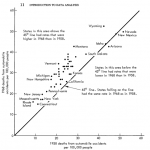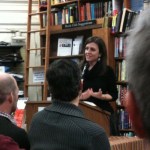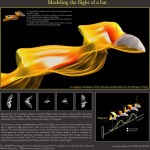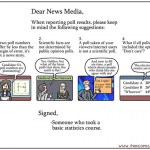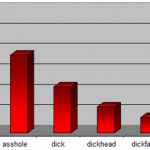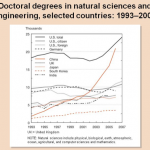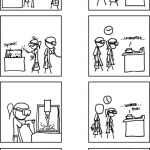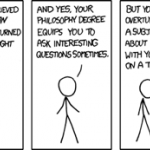Science in Culture & Policy
FYI: the winners of the AAAS Science and Engineering Visualization Challenge are up! You may recognize some of them - including PhD (Piled Higher and Deeper) cartoonist Jorge Cham. Check 'em out and share your opinions; I'll have more to say when I'm back from blogcation!
A quick follow-up to my mention of Edward Tufte last week: you should be aware that Edward Tufte's brief classic, Data Analysis for Politics and Policy, is available online as a PDF here. It's worth a skim in your spare time - and worth sharing with people who don't necessarily appreciate the limitations of statistics.
Last week, I braved a nasty sleety Cambridge evening to see Rebecca Skloot read from her excellent new book, The Immortal Life of Henrietta Lacks. I'm thrilled to tell you it's finally being released on Amazon tomorrow, so if you haven't already been to your local bookstore, go snag a copy (or enter to win one from Sb, through 2/23/10!)
In case you don't know the story, Henrietta Lacks was a young African-American mother who was stricken with a particularly invasive form of cervical cancer back in the early 1950s. She died within months, but her cancer cells remain alive today - millions of…
Modeling the flight of a bat (click to enlarge)
Dave Willis et. al., Brown University and MIT
Visual complexity is a paradox. On the one hand, complexity is a compelling feature known to capture a viewer's attention and stimulate interest. . . . On the other hand, complexity only arouses curiosity up to a point. When a visual is extremely complex, viewers may tend to avoid it altogether. -- Connie Malamed
I had a great time this weekend devouring Connie Malamed's oversized treasury of data visualization, Visual Language for Designers. The book couldn't be more appealing: it's like someone…
This is apparently a real ad for the hotly contested Orleans Parish Coroner's race:
Poor Dr. Frankenstein Minyard. This takes negative campaigning to a whole new level.
Jorge Cham's PhD skewers the "wisdom of crowds" - and poorly done stats.
For minority undergraduates interested in careers in science writing:
The American Association for the Advancement of Science (AAAS) is proud to offer a summer internship program for minority students interested in journalism as a career and who want to learn about science writing. Experience what it's like to cover the scientific and technological issues that shape our global community. The Internship takes place at the Washington, D.C. headquarters of AAAS's Science magazine, the largest interdisciplinary journal in the world. The program is a paid, 10-week experience under the guidance of…
Did you hear about the scio10 civility meltdown? More about that in a minute. As you may have heard, it got a bit. . . uncivil. I wasn't there, so you, like me, will have to get your impression from this highly realistic renactment, created by an attendee who witnessed the confrontation between Nature's Henry Gee and our very own Zuska:
Whoa. Do I detect some tension? I'm reminded of the classic post 7 reasons the 21st century is making you miserable, according to David Wong:
Some of us remember having only three channels on TV. That's right. Three. We're talking about the '80s here. So…
Speaking of China, two graphs from the brand-spanking-new Science and Engineering Indicators 2010:
I detect some trends.
What can scientists do about Hollywood's ongoing inability to depict science in a realistic manner, as depicted by xkcd? If you're interested in this question (or still angry that Scully was somehow able to complete a Southern blot on trace alien DNA over her lunch hour), you may be interested in tomorrow's Armed with Science guests: blogger Jen Ouellette, who's heading up NAS' Science and Entertainment Exchange, and the executive producer of SyFy's EUREKA.
Jennifer Ouellette, director of the National Academy of Sciences' Science and Entertainment Exchange, and Jamie Paglia, co-creator and…
The Endangered Species Print Project has a clever approach to conservation: a series of limited-edition prints depicting endangered species, with the number of prints correlating with the number of individuals left in the wild. For this sunlight-saturated Panamanian Golden Frog by Jenny Kendler, that's a wild population/print run of only 100. All the proceeds from print sales go to Project Golden Frog. (For other species, proceeds go to a conservation group helping that particular species).
Artists Jenny Kendler and Molly Schafer created the project, and maintain a detailed blog on…
It wasn't exactly a New Year's resolution, but Scibling Abel Pharmboy announced a new mission for Terra Sigillata this year:
Terra Sigillata will broaden its focus area to become an open platform for scientific and career development issues specific to underrepresented or underserved minority groups as described in the US by the National Institutes of Health: African Americans, Hispanic Americans, Native Americans/Alaska Natives who maintain tribal affiliation or community attachment, Hawaiian Natives and natives of the U.S. Pacific Islands, persons with disabilities, and underserved groups…
Street artist Banksy thumbs his spraycan at global warming skeptics.
Via Londonist, via the ESPP blog.
I encourage everyone to read this thoughtful post by Janet, and contribute your thoughts.
Often, questions about online civility are dismissed with the comment "get a thicker skin" - as if it simply doesn't matter whether people address each other with respect online. I think it does matter. In the offline world, the "us/them" mentality fosters prejudice and misunderstanding - just turn on FoxNews. If that mentality also dominates the online world, turning it into a bunch of bickering echo chambers, we lose one of our best opportunities for constructive dialogue with people of other…
To follow up on my previous review of KC Cole's book about the Exploratorium, here's a nifty exhibit called "How People Make Things." It's a traveling exhibit (by the Children's Museum of Pittsburgh, not the Exploratorium) that demonstrates the basics of manufacturing processes like injection molding and assembly.
It's interesting to compare the experience you may imagine having in the exhibit room above to the experience of the website, which uses a one-directional lecture mode (warning: be prepared for the Mr. Rogers cameo). It's ironically difficult to successfully translate hands-on…
"the whole point of the Exploratorium is for people to feel they have the capacity to understand things." --Frank Oppenheimer
I admit it: I'd never heard of Frank Oppenheimer until I received my review copy of K.C. Cole's Something Incredibly Wonderful Happens: Frank Oppenheimer and the world he made up. I thought for a day or two that it was a book about Robert Oppenheimer, the so-called "Father of the Atomic Bomb," and was thus completely befuddled by the book's cheery title and its cover - a fanciful cloud of iridescent bubbles.
Of course, I was off by a sibling. Frank Oppenheimer was…
Oh noes! Chris Mooney just used the phrase "scientific consensus on global warming" in a WaPo article on Climategate:
While the controversy has receded, it may have done lasting damage to science's reputation: Last month, a Washington Post-ABC News poll found that 40 percent of Americans distrust what scientists say about the environment, a considerable increase from April 2007. Meanwhile, public belief in the science of global warming is in decline.
The central lesson of Climategate is not that climate science is corrupt. The leaked e-mails do nothing to disprove the scientific consensus on…
I went to see Randall Munroe, creator of xkcd, a few weeks ago at MIT. Unfortunately the line to get him to sign books was about fifty frenzied geeks long, so I didn't stay for that. But I did enjoy his dialogue with the audience, which mainly consisted of answering questions ranging from obsessive fanboy minutia (why is xkcd published on Monday, Wednesday and Friday?) to vast and metaphysical (what is the true difference between geeks, nerds and dorks?) The latter question led to Munroe doodling and tinkering with a ridiculously convoluted Venn diagram, the details of which I can't remember…
Many of the commenters on my earlier post about the so-called wisdom of crowds, "Science is not a democracy," have expressed distaste for the phrase "scientific consensus." I don't really share that distaste, and here's why.
To me, it's like being disturbed by the phrase "electoral college." You may detest the way our nation's electoral system works; you may not trust the outcomes it produces; but there is an established system, and the electoral college is part of it. You can object to the existence of the electoral college and criticize its characteristics, and you can try to change the…
There are two contradictory headlines today on Google News, both regarding someone I couldn't care less about. However, they nicely illustrate one of my key concerns about the internet: the pervasive illusion that the "wisdom of crowds" is in fact wisdom, or in fact fact.
Both stories involve the heinous Jon Gosselin, who as far as I'm concerned is a waste of attention. You may have heard that the former reality TV star had his apartment trashed over the holidays, and that no one knows who's responsible. But if one turns to Google News, one can see that People Magazine appears to have an…
